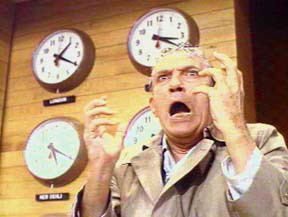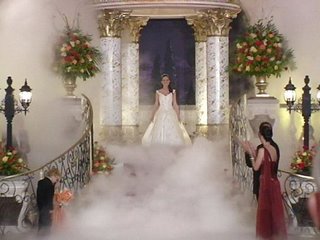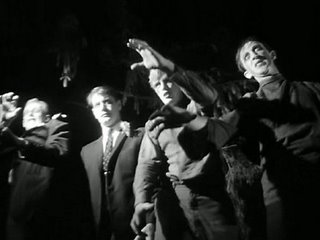
Even in 1976, I watched Network with a slightly jaundiced eye: It seemed a bit too pleased with itself--but let me interject: I did enjoy its attack on TV, being just enough of a gadfly myself to admire its impertinence. On the other hand, satirizing TV isn't that hard to do--indeed, by 1976 TV itself had done so itself any number of times--Sid Caesar and Steve Allen, Get Smart and The Addams Family, not to mention Rocky and Bullwinkle and the hijinks of Soupy Sales and Batman--and was on the verge of self-vivisection almost all the way down to the bone with Saturday Night Live. Still, at the time I was usually mad as hell all on my own; and, for about fifteen minutes in its second act, Network allowed me to imagine I wasn't going to take it anymore.
 But there was another movie in Network, one that I was too young to get into: The creepy bond between Diana Christensen (Faye Dunaway, a real live wire once more, neurotic and angular, a woman you could cut yourself on if you weren't careful) and Max Schumacher (William Holden, whom at the time I was only dimly aware of as an old-time actor; I probably would have remembered him from Stalag 17, but way up here in the present I can't say for certain whether I'd have made the connection to Born Yesterday, Bridge on the River Kwai, or even The Wild Bunch, let alone the role that most resembled Max, Joe Gillis in Sunset Blvd. If I had to make a guess, though, I'll bet I had a clear image of him on I Love Lucy, stunned by Lucy's fake nose catching on fire.) At twenty, I had no idea why their relationship made sense.
But there was another movie in Network, one that I was too young to get into: The creepy bond between Diana Christensen (Faye Dunaway, a real live wire once more, neurotic and angular, a woman you could cut yourself on if you weren't careful) and Max Schumacher (William Holden, whom at the time I was only dimly aware of as an old-time actor; I probably would have remembered him from Stalag 17, but way up here in the present I can't say for certain whether I'd have made the connection to Born Yesterday, Bridge on the River Kwai, or even The Wild Bunch, let alone the role that most resembled Max, Joe Gillis in Sunset Blvd. If I had to make a guess, though, I'll bet I had a clear image of him on I Love Lucy, stunned by Lucy's fake nose catching on fire.) At twenty, I had no idea why their relationship made sense.And even now at forty-nine, I'm still at a bit of a loss. Of course, these two could easily get together because, as a friend of mine blandly observes whenever something implausible happens in a movie, they're fictional. And more than that, I completely understand the urge toward the stuntwork required to tackle Faye Dunaway; but watching Network for the first time in many years, I heard both movies--the TV savage satire and the desperate-hours love affair--creak more than a little. The past thirty years have not been kind to pop culture. Network does get right the movement toward "reality" TV and the use of unstable personalities to anchor programs; but from our vantage point it is too meek in its assault on TV and the personalities who sledgehammer it together. I suppose that is a compliment to the film: It gets it right, while imagining that some consciences remain on both sides of the screen--but its that second assumption, the one about consciences, that doesn't ring true. OK, Max walks away--but not before a long drink at the sludgy TV well.
 On actual TV, no one really leaves, not even Geraldo. They just grow back their singed mustaches and jump back into the fire. And Spike Lee's Bamboozled (2000) merely repeats Network by way of The Producers (1968). Not to be overly cynical, but as I watch My Super Sweet 16 or The Joe Schmo Show or The Simple Life--or on and on--I see the new demographic emerging, one that is not simply post-moral but hungry--and not for mere consumerism or escapism but with a kind of Romero-esque voracity, in which the old earth is eaten up and the new one disgorged in a pimped ride with a "mission accomplished" banner--
On actual TV, no one really leaves, not even Geraldo. They just grow back their singed mustaches and jump back into the fire. And Spike Lee's Bamboozled (2000) merely repeats Network by way of The Producers (1968). Not to be overly cynical, but as I watch My Super Sweet 16 or The Joe Schmo Show or The Simple Life--or on and on--I see the new demographic emerging, one that is not simply post-moral but hungry--and not for mere consumerism or escapism but with a kind of Romero-esque voracity, in which the old earth is eaten up and the new one disgorged in a pimped ride with a "mission accomplished" banner--I'll calm down. I suppose, given my tirade, I'll have to admit that Network, watched from the post-millenial perch, is almost quaint in its reassurance that one can walk away, as Max does. The problem, though, is where? I mean, it's not as if the West--let alone the present--has a particular monopoly on venal behavior. There are, of course, no safe havens or good old days. And if I had to be honest, I do think it's simple crass materialism I'm most worried about--as our old friend Karl M. tells us, all freedoms are sacrificed for one: Free Trade. Naturally, everyone likes an all-you-can-eat buffet; but again, conspicuous consumerism without limits leads ultimately to cannibalism. I'll stop now, having realized that, whenever one follows this line long enough, it leads to Soylent Green. Take what you like, but eat what you take.

No comments:
Post a Comment